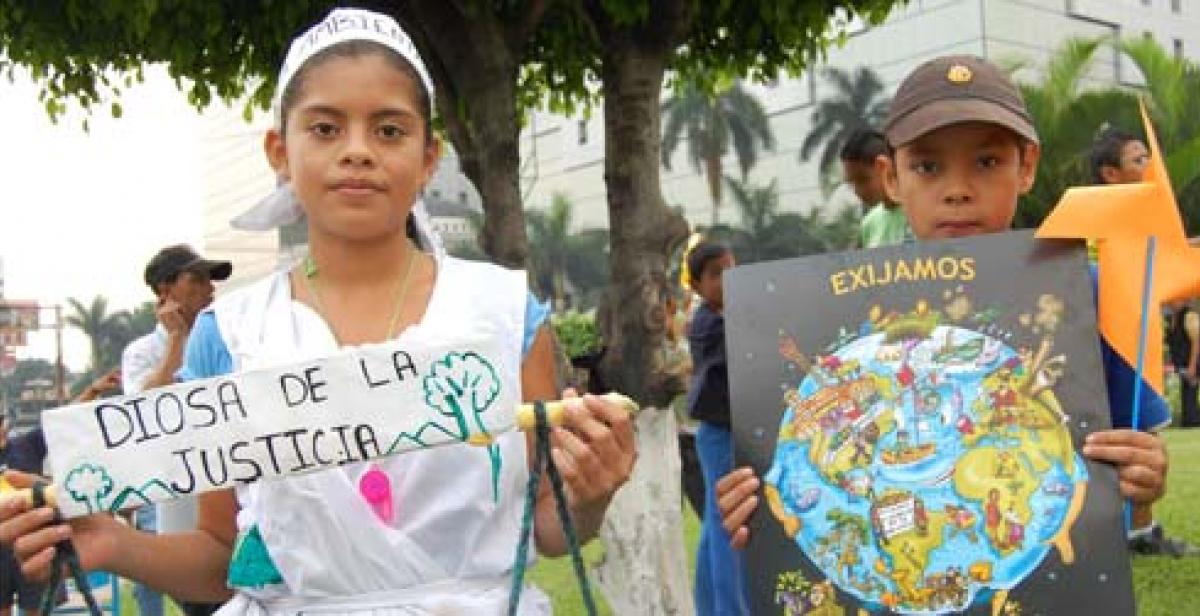I spent a lot of my recent visit to the United States thinking about what kinds of changes are going to have to take place to face and adapt to climate change.
The Climate Justice Now! campaign in El Salvador was fresh in my mind as I descended in a plane, watching large expanses of territory saturated with electricity, cars everywhere, and stretches of pavement, highways, parking, and shopping malls. I asked myself, "Are people really going to be willing to change?"
I thought about the final session of the course I was taking back in El Salvador titled "Climate change and adaptation methods in Central America", where Dr Angel Ibarra, president of UNES (Unidad Ecológica Salvadoreña – Salvadoran Ecological Unity, a Progressio partner organisation), proposed a radical uprooting of food systems as a start towards adaptation to the impacts of climate change.
This would mean re-thinking what we grow, how and where it's grown, how it is packaged, and how it gets to the people that eat it. It would mean going back to agricultural practices that were used by societies in all parts of the globe not that long ago. And it would be just a start.
As I mulled this over, observed and observed, I came to the conclusion that I'm really not sure it's possible for the US population to be willing to make these kinds of deep changes. But we must. That's why I think it's all the more necessary that campaigns like Climate Justice Now! exist. If the will to change isn't there, then the pressure needs to get put on.
So what do we mean when we say "climate justice"? What are we demanding, and what will we bring to the upcoming climate negotiations in Cancun, Mexico?
The Climate Justice Now! campaign proposes the defence of the ecosystems and territories in Meso America* in the face of the climate crisis we are in. The guiding principles of the campaign are:
1) Acknowledgement of ecological debt:
When we look at the history of plundering, resource extraction and land snatching, and now the disproportionate ratios of who has occupied and polluted the atmosphere, we see a pattern: a small number of people have violently helped themselves to things that are not theirs, in defence of an economic model that now risks the collective well- being of the planet.
The principles of ecological debt pose the question, "Why is it that we are in debt to you (through institutions such as the World Bank), when you owe us for centuries of plunder, war, and resource extraction, that now make us more vulnerable to the climate change you have disproportionately caused?” It flips the script and challenges the history of unjust and oppressive actions imposed on poor countries by rich ones. It re-frames the argument and gets to the root of the problem.
2) Emissions reductions NOW, not more false solutions:
Climate change is a symptom of a greater cause: the current economic model. That model cannot be used to solve the problem that it has caused in the first place.
Market-based solutions, such as carbon markets (less-emitting countries sell their carbon emissions allowances to over-emitting countries), do not address the root of the problem: an economic model which turns natural goods into profits, which benefit a small percentage of the population. The Climate Justice Now! campaign sees these solutions as just another tactic for polluting countries to try to avoid really having to cut their emissions.
3) "The North is not our paradigm"
"We don't need to be like them to enjoy life," someone in El Salvador commented to me once, referring to cultures in rich northern countries. The "development" model of shopping malls, large highways, fast food, and consumerism is not what is needed to resolve the climate crisis and live well.
Really it's about simplifying life. Do we really need so much stuff? Do we need so many options at the dinner table? Do we need to get everywhere really quickly? Or is there a way that we can live in harmony with nature, value the earth, and live well? We think so.
We think we can revert to old practices and develop new ones with the key values of sustainability, balance and harmony with nature, justice, equality, participation of all sectors of society, and the recognition of the rights of Mother Earth at their core. We embrace the indigenous Andean idea of "el buen vivir", and "el buen convivir", which literally mean "good living" and "coexisting well". It means building a life in harmony and equilibrium between men and women, between different communities, and, above all, between human beings and the natural environment of which they are part.
Where to begin? This struggle doesn't start or end in Mexico, but it gives us the opportunity to strategise, coordinate, build alliances, and build visions and proposals. It's about defending our agenda in Mexico, but also building new realities at home.
We are preparing for Mexico and beyond. Are you?
Maggie Von Vogt is a Progressio development worker in El Salvador.
* Meso America is a term used to describe the region that includes all the Central American countries – Guatemala, Belize, Honduras, El Salvador, Nicaragua, Costa Rica, Panama, and the central and southern section of Mexico. The term is often used in place of "Central America" because people feel it is a term that recognises common histories and cultural practices by the many indigenous populations of the region.
Photo: "The godess of justice" and "We demand Climate Justice Now!" – young participants in the Earth Day march held by UNES in San Salvador, 22 April 2010.



